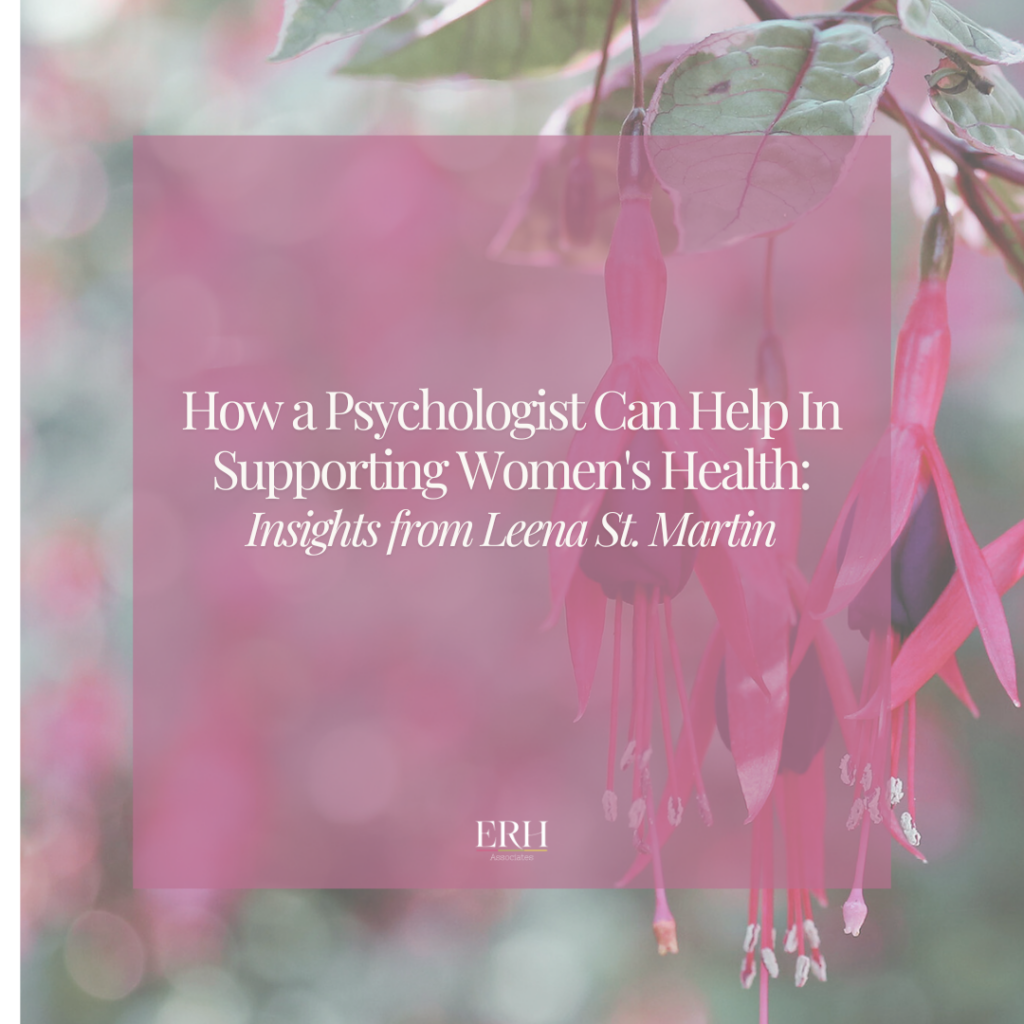Our colleague Leena St Martin, a clinical psychologist has extensive experience in women’s health, incluing gynaecological concerns (pelvic pain, genital pain syndromes, gynaecological cancer, hypothalamic amenorrhoea, relationships including grief and adjustment to change arising from health issues. In this article Leena shares insights into how a psychologist can support those navigating significant hormonal changes, including menopause. Below, Leena provides an overview of what to expect in a psychologist appointment, common therapeutic approaches such as cognitive behavioral therapy (CBT), and how therapy can enhance well-being in terms of mood, body image, and relationship dynamics. Many women with endocrine or gynaecological concerns find that working through these aspects with a psychologist can be a powerful adjunct to medical care.
Why Have I Been Referred to a Psychologist?
Psychologist input can be a helpful resource for a variety of gynecological concerns and life transitions affecting health, including the challenges brought on by hormonal changes.
WHAT HAPPENS IN A PSYCHOLOGY APPOINTMENT?
Your psychologist will be interested in understanding your goals for the session; what you hope to get from the appointment. In the initial appointment the psychologist will need to ask you various questions to help them understand how you have arrived at a particular set of circumstances.
For example, what prompted you to seek help at this time?
Is the problem related to a relationship situation or the way you are feeling generally?
What solutions have already tried?
What support do you have with the difficulties you are currently facing?
If you’re dealing with mood changes, the psychologist will ask questions about your symptoms and may also suggest that you consult your GP or psychiatrist if the symptoms are severe or concerning to you or to others.
If psychological therapy is indicated, there are many treatment pathways on offer. One of the most well-known and effective methods is cognitive behaviour therapy (CBT). CBT is an evidence-based approach aimed at addressing the links between how we think, how we feel (our emotions), how our bodies respond, and how we behave. CBT fits very well with the biopsychosocial approach used in medicine. CBT is typically a brief therapy which includes homework suggestions between appointments. You may be encouraged to explore and record information around how you handle situations, for example. This information will give the psychologist an idea of how to focus and direct the treatment.
Your psychologist may then work with you to address thinking patterns, learn emotional regulation skills if mood-swings are an issue, perhaps adopt a more compassionate way of relating to yourself, look at lifestyle improvements which may improve your mood (e.g. sleep hygiene, activity levels), encourage effective problem-solving, and look at interpersonal functioning which includes relationships with partners. Your psychologist will typically review your progress in these areas after a few sessions in order to determine whether your goals have been achieved, new goals have emerged, or whether a different treatment approach might be helpful.
Many people going through hormonal change will have concerns about changes to their body and sexual experience. A body which was once reliable and familiar may suddenly feel unfamiliar and unpredictable. Common scenarios include weight gain, fatigue, changed shape (meaning clothes hang differently), reduced exercise tolerance, and reduced/altered sexual response. These changes can often feel perplexing, and sometimes it an feel like they have come from nowhere.
Acknowledging the sense of losing a previous identity, or aspect of your identity, can be an important part of psychological therapy. And exploring and navigating new ways to enjoy life through the body we now have is an important step forward. This is usually alongside the treatment advice given by your endocrinologist and/or other specialists.
A psychologist skilled in sex and relationship therapy will be able to help with concerns such as a change in sexual interest, or reduced physiological sexual response. If sexual intercourse has become painful, pelvic physiotherapy may be a helpful adjunct whilst you reset your sexual foundations. Considering overall relationship satisfaction, such as emotional connection and goodwill shown to one another is a very important basis for knowing whether to consider sex therapy or whether other adjustments or changes around the relationship are called for. Many couples admit they’ve never previously had to discuss sexual concerns with each other, and sometimes a new strength and connection can emerge at these times.
There are plenty of excellent self-help resources on restoring sexual function and your psychologist should be able to guide you towards useful options.
Suggested Resources
About Leena St Martin
Leena St Martin
MA (Hons), PG DipClinPsych, MNZCCP
Clinical Psychologist
Contact Details
- Phone: 021 627 336
- Email: leenasmnz@gmail.com
- Appointments: Online or at ERH Associates (by arrangement)
Specialties
- Women’s health (gynecological concerns, menopause, pelvic pain)
- Relationship challenges (grief, adjustment to health issues)
Background and Therapeutic Approach
Leena has been a clinical psychologist since 1995. Her early career included community mental health, corporate roles, and volunteering at Lifeline and the SPCA. She specializes in gynecological and female sexual health, working within a biopsychosocial framework that incorporates evidence-based approaches like CBT. Her sessions are collaborative, goal-focused, and tailored to the individual.
Leena’s Finnish/Anglo-Indian heritage and New Zealand upbringing provide her with a culturally sensitive perspective. Outside of work, she enjoys exploring nature, whether in the bush or by the ocean.
Qualifications and Professional Affiliations
- Master of Arts (First Class Honours), University of Auckland
- Post Graduate Diploma in Clinical Psychology, University of Auckland
- Member of the NZ College of Clinical Psychologists and NZ Psychological Society
- Registered with the NZ Psychologists Board
Session Details
- Online sessions: $220 (60 minutes)
- In-office sessions: $230 (60 minutes)
- Payment: Please pay before your appointment via ASB 12-3100-0205621-00 (L St Martin). A receipt will be provided for insurance claims.

Comments +